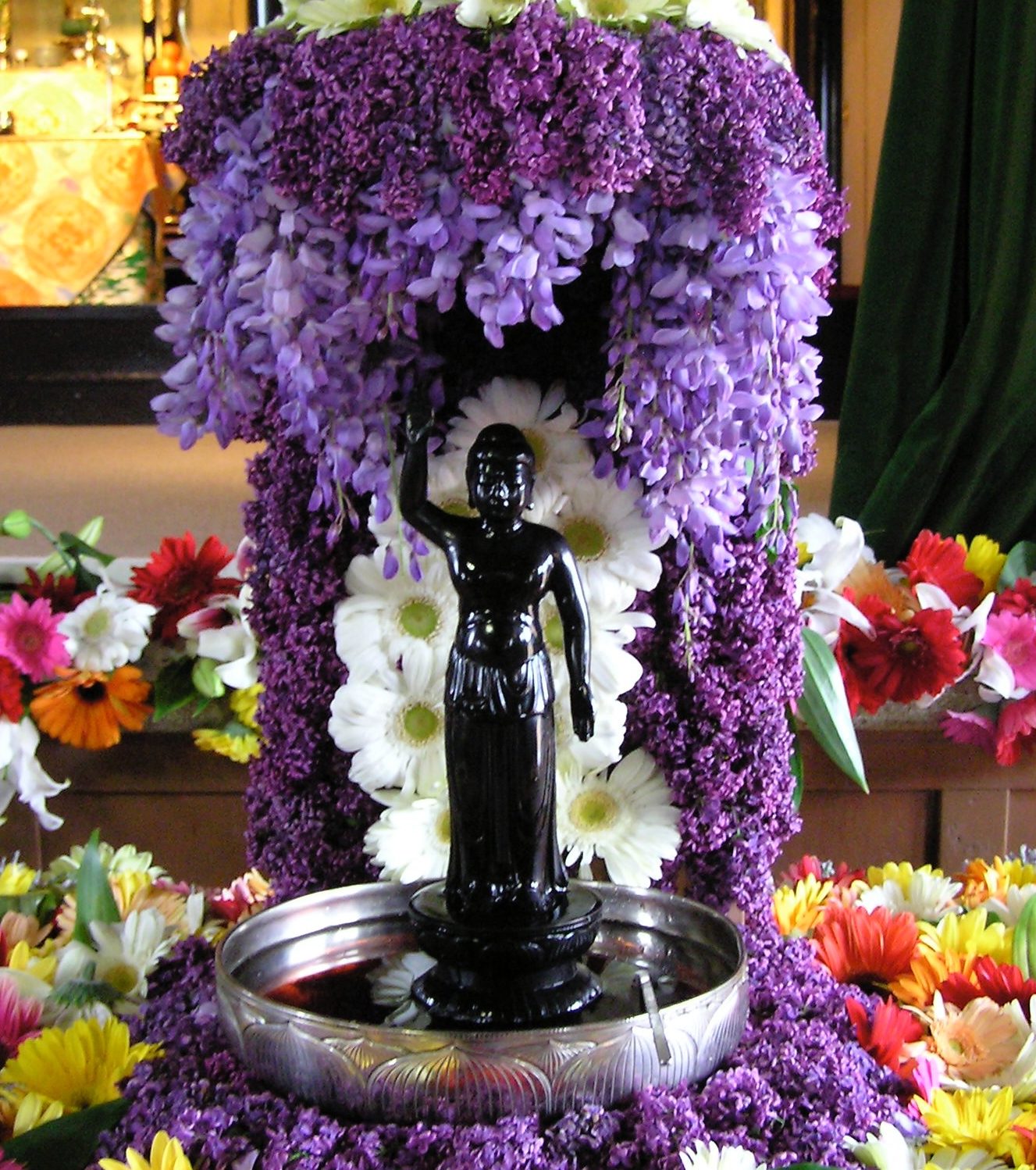
By Rev. Kenjun Kawawata
This week, we celebrate the Buddha’s birth, which in Japanese is called “Hanamatsuri” (festival of flowers). It’s a time to think about the importance and preciousness of individual life. It also reminds me of a story called “The King and His Four Wives.”
It’s said when the Buddha was born, he walked seven steps and proclaimed, “Above the heavens and below the heavens, I am the only Noble One.” This statement means that I have received a precious life. I think he represented all living beings when he made that statement. All life has the same quality as the Buddha’s, and each life is precious and unique.
In the Larger Infinite Life sutra, the Buddha said, “Immersed in lust and craving, human beings in this world are born alone and die alone, depart alone and arrive alone. From here, their actions lead towards a destination that is a place of neither pain nor pleasure—each individual must experience this by himself; no one else can take his place.”
The Buddha said that we are born alone and die alone, that your karma creates your life, pain and pleasure. Nobody can take your place. No one else can have your life. You cannot exchange your life for another.
Each individual life is unique. You’re the only one who can live your life. You may think you have a family, so you are not living alone, but one must experience one’s own life alone.
For example, each individual has different favorite foods. When families have dinner, they may share and eat the same food, but each person has a different taste. Someone may complain it’s too salty or too sweet. Someone may like spinach and others may not.
Even if we live together, we have different experiences and feelings in our daily lives. Our individual life is different, unique and precious. We’re responsible for our own lives. No one else can take responsibility for your life. Ultimately, we can’t depend on anyone or anything. We can only rely on ourselves and the Dharma.
I’m reminded of the story, “The King and His Four Wives.” Once there was king who had four wives. The king was about to die, and in his last moments he called each of his wives to his bedside one-by-one.
To the first wife he said, “You’ve been my most loyal and devoted wife and I’ve loved you the most. I’m about to die but I’m afraid and don’t want to die alone. Please, will you go with me?”
The first wife answered, “You’ve been a most wonderful king and husband, and have showered me with diamonds, gold and other riches, but I’m sorry, I cannot go with you.”
Then the king called the second wife and asked her, “You’ve always been my most obedient wife. I’m about to die, and I don’t want to die alone. Please, won’t you go with me?”
The second wife answered, “You’ve been a most generous king and husband, and provided me with a huge palace to live in with the finest furnishings, but I’m sorry, I cannot go with you.”
He called his beautiful, talented and accomplished third wife, of whom he was extremely proud and had showed off to neighboring kingdoms. But when she was asked to accompany him in death, she refused the same way as his first and second wives.
His fourth wife was very caring and supportive of the king, and always comforted him in times of need, through good times and bad times. When the king asked her to go with him to the afterlife, she said: “You were a great king and husband, but I cannot go with you. You can count on me to arrange for a grand funeral and we will attend the service, but I cannot go with you.”
In this parable, the first wife represents our fortune. No matter how much wealth we have amassed, we cannot take it with us when we die.
The second wife is like our comfortable home that we must leave behind when we die, no matter how large, comfortable and beautiful it may be.
The third wife symbolizes fame and social status. Even if you’re a sports celebrity, a popular entertainer or the President of the United States, in death your life ends just like everyone else. We are all human beings.
The fourth wife is like our family. No matter how much we love them or how much they love us, we cannot take our families along with us. When we die, we must die alone.
We have received this life from previous lives, and we will die sometime in the future. What is the meaning of birth and death? How can we find meaning in this life? What can we really depend on for a meaningful life?
The celebration of Hanamatsuri is not only the celebration of the birth of one person, who has lived in history. Hanamatsuri is an expression of our joy of living, to realize our connection to others, and the joy in being able to encounter the teachings of the Buddha, here and now.
Some of our temples will observe Hanamatsuri this Sunday, April 10. Please check with your local temple.
-Rev. Kawawata is bishop of Higashi Honganji’s Hawaii District

